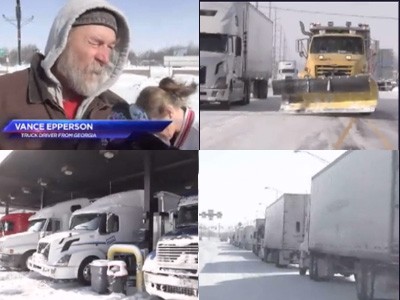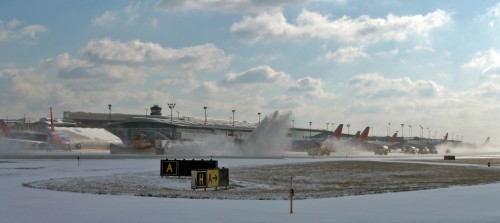Zooming along at a slippery 30 mph this morning, I tuned into a satellite radio trucker channel; an open-line program drew callers from around the United States reporting on problems big rigs were facing.
My ears pricked up when one driver listed a string of truck stops in Illinois and Indiana that were out of fuel. Imagine depending on your rig’s engine not only for livelihood but for heat and power in your sleeping compartment, and finding out the pumps were dry for some hundreds of miles to come?
Here’s a WISH-TV report from Indianapolis about a long back-up of semis onto the expressway, as congestion in a fuel-less truck stop lot led to gridlock and unorthodox traffic maneuvers.
And in a sort of related story, the winter deep freeze has prompted Wisconsin officials to temporarily lift some of its transportation department rules, like truck weight restrictions, to streamline the trucking of fuel, milk and other commodities. Even as the worst of the sub-zero temperatures passes this week, the bottleneck and backlog to the freight and transportation industries is likely to linger and to ripple out to consumers at gas stations, grocers and other entities that deal in consumables. It’s a useful and easy story to localize, and I’d start with a visit to local truck stops to get examples directly from those behind the wheel. Stranded drivers, stranded loads, drivers unable to get to their next load, etc. — what’s the toll on humans and cargo? What about perishable cargo such as fruits, vegetables, flowers and livestock?
In addition to difficulties on the road, the bottleneck likely has wrought havoc with drivers’ hours of service vs. rest periods — much as Jet Blue ran into a snafu related to mandatory rest periods for flight crews — meaning some loads might be delayed, incurring loss of revenue for drivers and trucking companies that will outlast the winter weather. Overdrive Magazine is just out with a list of states offering exemptions; some pertain to loads of heating oil or other “emergency” provisions — you might check with your governor’s office or transportation department about any temporary measures brewing.
Here’s a fresh article from the online publication Fleet Owner, “Gauging the impact of winter storms on trucking,” that includes helpful background information to help you form questions for local fleet operators; note that weather risk for trucking companies is measured in billions of dollars per year.
And in another shortage-related story: Donated breast milk for premature babies is at “dangerously low” levels due to the logistical difficulties created by the cold snap, reports the Wisconsin State Journal. While not generally a business transaction, you might use this tidbit as a springboard to check in on the winter blast’s effect on health system / hospital supplies and deliveries of, say, transplantable organs, blood and other life-saving perishables.











